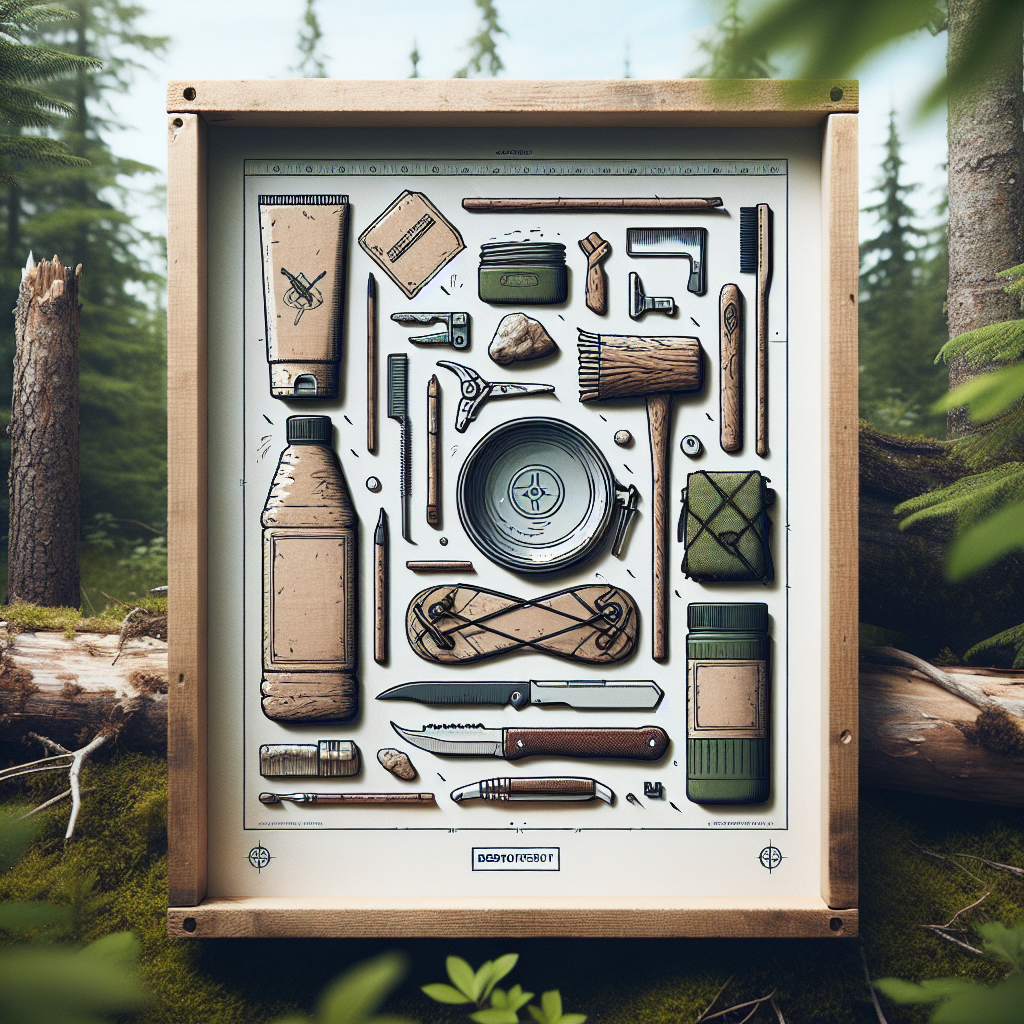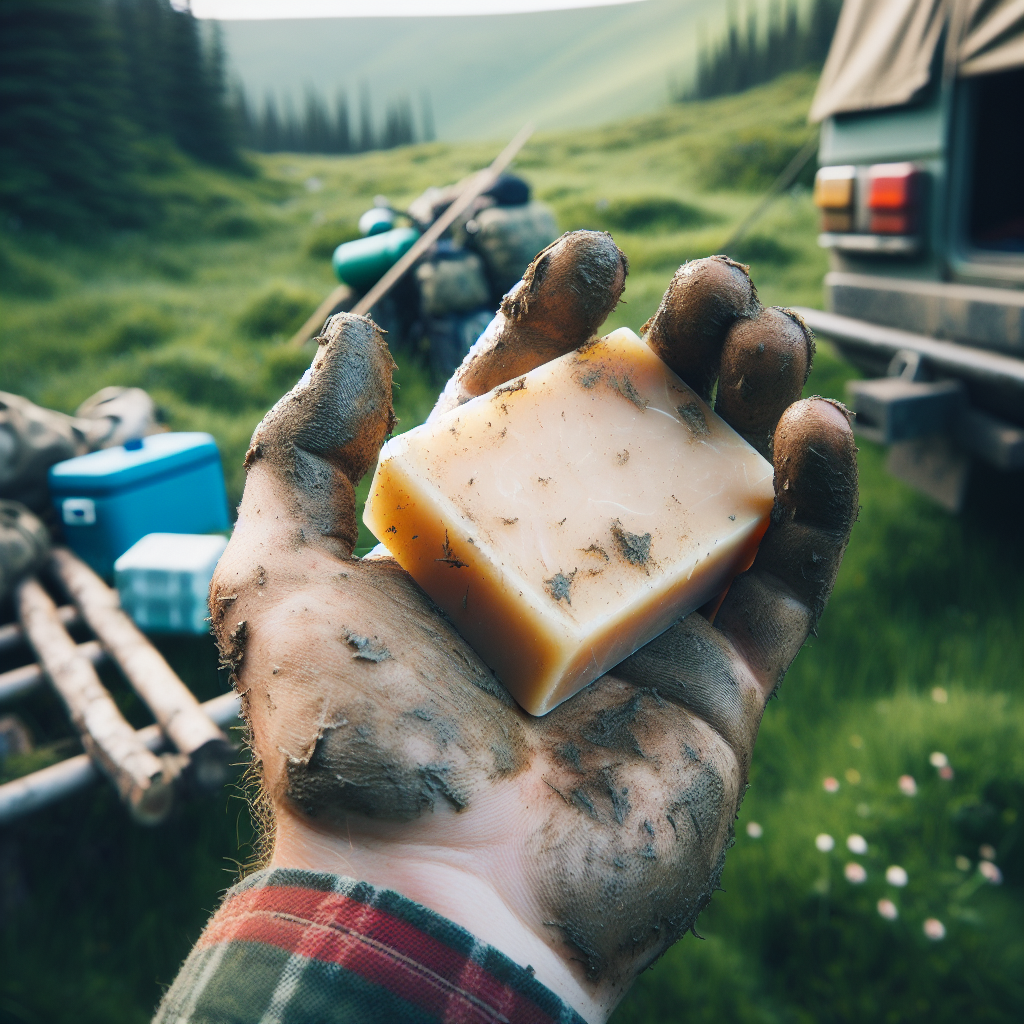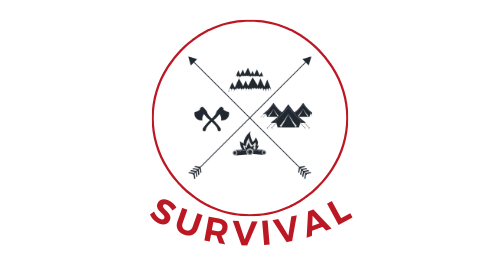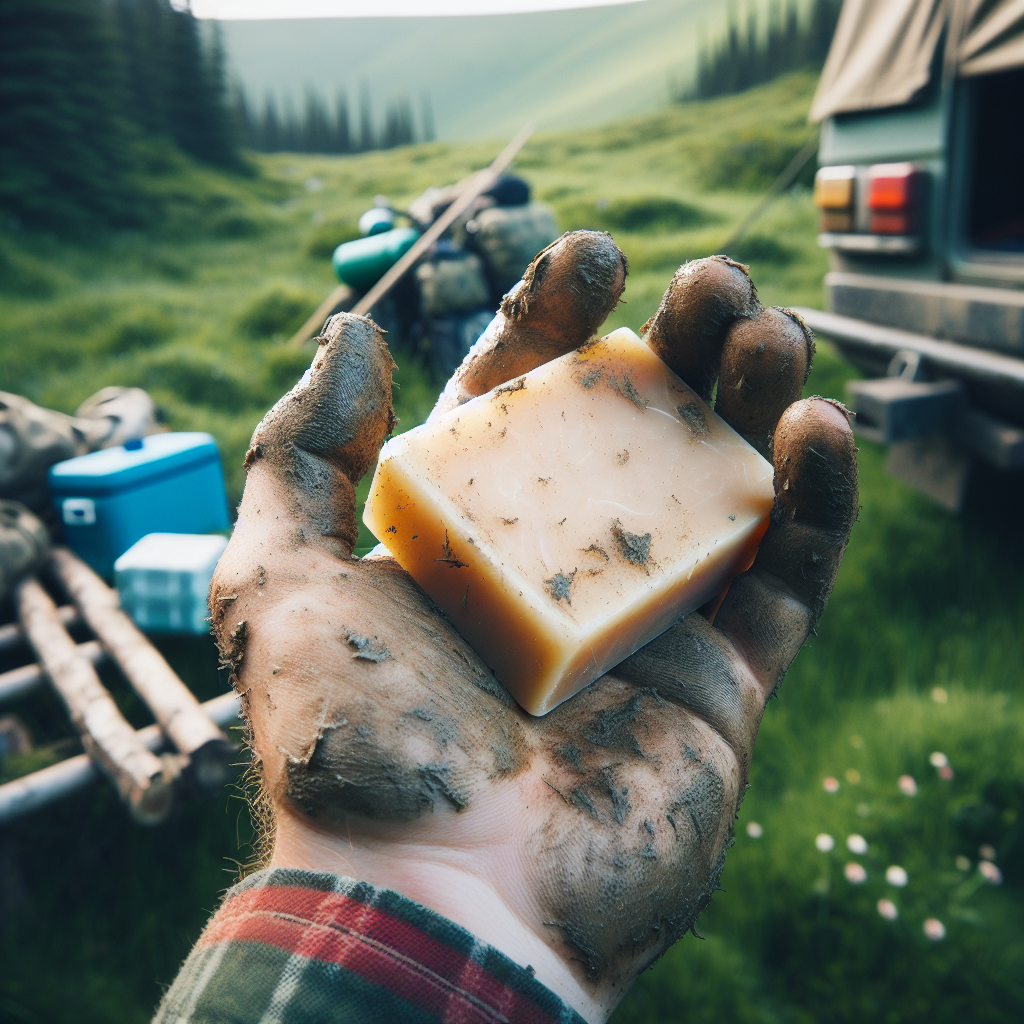In this article, you will discover practical tips and tricks to maintain good hygiene in the wild, even when you have limited resources at your disposal. Aiming to keep things friendly and informative, we will explore innovative ways to stay clean, fresh, and healthy while enjoying nature’s beauty. From simple hygiene practices to clever hacks, you’ll learn how to adapt and thrive in the great outdoors without compromising your cleanliness standards. So, grab your backpack and get ready to uncover the secrets of staying hygienic in the wild!
Personal Hygiene
Importance of Personal Hygiene in the Wild
When venturing into the wild, personal hygiene might not be at the forefront of your mind, but it is still incredibly important. Maintaining personal hygiene helps prevent the spread of diseases and infections, boosts your overall well-being, and enhances your comfort during your outdoor adventures. It helps you feel good both physically and mentally, allowing you to fully enjoy your time in nature without any unnecessary discomfort.
Understanding Limited Resources
One of the challenges of practicing personal hygiene in the wild is the limited availability of resources. Compared to the convenience of modern life where water and other supplies are readily accessible, in the wild, you must understand that resources are scarce and need to be used wisely. This means being mindful of how much water you use and finding efficient ways to maintain cleanliness while minimizing your impact on the environment.
Basic Personal Hygiene Practices
In the absence of modern facilities, practicing basic personal hygiene becomes essential. Start by washing your hands regularly, especially before preparing and eating food. Use biodegradable soap and fresh water if available, or alternatively, use hand sanitizers to kill germs. Additionally, maintaining good oral hygiene by brushing your teeth with a toothbrush and toothpaste is crucial for preventing dental problems. Remember to carry a small travel-sized toothbrush and toothpaste in your wilderness kit.
Using Natural Alternatives
When it comes to personal hygiene in the wild, it can be helpful to explore natural alternatives to commercial products. For example, if you don’t have access to soap, you can use natural substances like crushed leaves or pine needles with water for cleaning. For washing your hair, you can use baking soda mixed with water as a natural shampoo replacement. These alternatives are not only eco-friendly but also allow you to adapt to the limited resources available in the wild.
Maintaining Dental Hygiene
Your dental hygiene shouldn’t be neglected even in the wild. Brushing your teeth not only keeps your breath fresh but also prevents dental issues that can become troublesome later on. In addition to brushing, using dental floss to remove food particles and rinsing your mouth with clean water after meals can help maintain good oral health. If you have access to salt, you can even make a saline rinse to keep your gums healthy.
Water Sources and Purification
Finding Clean Water Sources
In the wild, finding clean water sources can be challenging. However, it is crucial to prioritize locating safe drinking water to maintain personal hygiene. Look for flowing water such as rivers or streams as they are often less contaminated than stagnant water sources. Natural springs are also a reliable option. Avoid collecting water from sources near human activity or areas where animal waste is present, as they can be contaminated.
Methods of Water Purification
To ensure the water you find in the wild is safe to drink, it is necessary to purify it. There are several methods you can use:
Boiling Water
Boiling is one of the most effective ways to purify water in the wild. Simply bring the water to a rolling boil for at least one minute to kill off any parasites, bacteria, or viruses that may be present. Allow the water to cool before consumption.
Using Water Purification Tablets
Water purification tablets are another convenient and lightweight option. These tablets typically contain chemicals such as iodine or chlorine, which effectively kill harmful microorganisms. Follow the instructions on the tablet packaging for proper usage.
Building a Water Filter
If you’re staying in one place for an extended period, building a water filter can be a useful long-term solution. You can create a simple filter using materials like sand, charcoal, and gravel. This homemade filter will help remove larger particles and debris from the water, making it safer for consumption.

Sanitation and Waste Management
Importance of Sanitation in the Wild
Maintaining proper sanitation practices in the wild is vital for both personal health and environmental preservation. By properly managing waste and practicing good hygiene, you can prevent the contamination of water sources, reduce the spread of diseases, and minimize your impact on the fragile ecosystems around you.
Proper Disposal of Human Waste
When nature calls, it’s important to know how to properly dispose of human waste in the wild. Digging a hole at least 6 to 8 inches deep and 200 feet away from any water sources or camping areas is the recommended method. After you’re finished, cover the hole with soil and disguise it with natural materials to minimize its impact on the environment and prevent the attraction of animals.
Building a Latrine
In situations where you might be staying in one location for an extended period, such as a base camp, it’s beneficial to build a latrine. Choose an area far away from water sources and camping areas, and dig a larger hole around 1 to 2 feet deep. This will allow for multiple uses over time. Create privacy by using natural materials like branches or building a small structure around the latrine.
Considerations for Females
Females have additional hygiene considerations in the wild, particularly during menstruation. Make sure to pack enough sanitary products, ziplock bags for disposal, and extra toilet paper or biodegradable wipes. Follow the same waste disposal guidelines mentioned earlier, ensuring that all waste is properly buried or packed out. It’s important to maintain good hygiene during this time to prevent infections or discomfort.
Managing Trash and Litter
Properly managing trash and litter in the wild is essential for minimizing your impact on the environment and maintaining cleanliness. Always pack out what you pack in and leave no trace of your presence. Carry sealable bags or biodegradable trash bags to store your waste. If you come across any litter left by others, take the initiative to pick it up and dispose of it properly. Be mindful of not leaving behind any non-biodegradable items that could harm the ecosystem.
Bathing and Cleaning
Benefits of Regular Bathing
Keeping clean in the wild is not just about hygiene; it also contributes to overall well-being. Regular bathing has numerous benefits, including removing dirt and sweat that can lead to skin irritations or infections. It refreshes both the body and mind, making you feel more comfortable and rejuvenated during your outdoor adventures.
Making the Most of Limited Resources
When it comes to bathing in the wild, making the most of limited resources is crucial. Use natural water sources such as rivers or lakes to bathe, ensuring you follow the principles of Leave No Trace. To minimize your impact, use eco-friendly biodegradable soaps and shampoos, or consider alternatives such as using natural ingredients like baking soda or sand to scrub away dirt and grime.
Sponge Bathing
In situations where a full-body bath is not feasible, sponge bathing is a practical alternative. Fill a basin or container with water and use a cloth or sponge to wash your body. Start from the top and work your way down, ensuring you cover all areas. It’s important to rinse off any soap residue to avoid skin irritation.
Using Biodegradable Soaps
When you do have access to soap, opt for biodegradable and environmentally-friendly options. These soaps are formulated to break down quickly and minimize harm to the surrounding environment. They are a responsible choice that allows you to maintain personal hygiene while respecting nature.
Cleaning Clothes and Camping Gear
Keeping your clothes and camping gear clean contributes to both personal hygiene and the longevity of your equipment. Regularly wash clothes using biodegradable laundry detergent and water from natural sources. If a washing machine or commercial detergent is not available, you can use the agitation method by placing clothes in a sealed bag with water, detergent, and rubbing them together. Remember to rinse clothes thoroughly and dry them properly before storage. Clean camping gear, such as cookware or utensils, with hot water and biodegradable soap to prevent the build-up of bacteria and food residue.

Managing Insect and Pest Control
Understanding the Importance of Pest Control
Insects and pests are a common nuisance in the wild, and managing them is crucial for maintaining personal hygiene and preventing discomfort. Insects like mosquitoes and ticks can transmit diseases, while pests such as mice or raccoons can contaminate food supplies. Effective pest control measures are essential for a pleasant and healthy outdoor experience.
Preventing Bug Bites
Preventing bug bites is key to avoiding potential diseases and minimizing skin irritations. Cover exposed areas of your skin by wearing long-sleeved shirts, pants, and hats. Use insect repellents containing DEET or picaridin on exposed skin and reapply as necessary. It’s also helpful to wear light-colored clothing, as darker colors tend to attract insects.
Using Insect Repellents
Insect repellents are a valuable tool for keeping bugs at bay. Choose a repellent containing DEET or picaridin, as they are effective against a wide range of insects. Apply the repellent to exposed skin, following the instructions on the packaging. Be cautious when using repellents on children or individuals with sensitive skin, and consider alternative natural repellents if necessary.
Identifying and Dealing with Common Insects
Knowing how to identify and deal with common insects in the wild can help you minimize their impact on your hygiene and comfort. For example, if you notice a tick on your body, carefully remove it with tweezers by gripping the tick as close to the skin as possible and pulling upward with steady pressure. Clean the bite area with antiseptic. If you encounter bees or wasps, calmly move away to avoid getting stung. Learning about the specific insects in the area you’re exploring can help you take appropriate preventive measures.
Keeping Food and Supplies Pest-Free
Proper storage and handling of food and supplies are crucial for preventing pests in your campsite. Store all food in airtight containers or hang them in bear bags to keep them out of reach of animals. Dispose of food waste by burning it completely or packing it out in sealed bags. Clean cookware thoroughly after each use to eliminate any lingering food odors that can attract pests. Being diligent in these practices will minimize the risk of attracting unwanted visitors to your campsite.
Maintaining Personal Hygiene in Extreme Conditions
Cold Weather Hygiene
Maintaining personal hygiene in cold weather conditions presents unique challenges. In freezing temperatures, the limited availability of water can make hygiene practices difficult. However, it is still essential to maintain cleanliness to prevent skin issues and infections. Opt for sponge bathing, using moist wipes or biodegradable soaps for spot cleaning. Prioritize washing the face, hands, and feet to minimize odor and reduce the risk of frostbite.
Hot Weather Hygiene
In hot weather, maintaining personal hygiene is crucial to prevent heat-related illnesses and discomfort. It’s essential to stay hydrated and protect yourself from the sun. Take advantage of natural water sources to cool off and refresh yourself. Focus on keeping key areas like underarms, groin, and feet clean and dry to prevent odor and reduce the risk of heat rash or fungal infections.
Hygiene During Rainy Seasons
During rainy seasons, personal hygiene can become more challenging due to limited dry spaces and potential water contamination. However, it is crucial to maintain cleanliness to prevent infections and discomfort. Seek shelter under trees or use waterproof gear to keep yourself relatively dry. Utilize the rainfall to collect water for washing, using biodegradable soap or natural cleaning options when available. Extra care should be taken to keep feet clean and dry, as prolonged dampness can lead to fungal infections.
Hygiene in Desert Environments
Hygiene practices in desert environments require adaptability due to the scarcity of water. Limited water availability means conserving it and finding alternative solutions for staying clean. Wet wipes or moisture-absorbing towels can be effective for wiping off sweat and removing grime. Use biodegradable dry shampoos or natural ingredients like cornstarch or baking soda to keep hair and scalp fresh. Focus on maintaining proper foot hygiene and wear breathable socks to prevent blisters and fungal infections in the arid desert climate.
Hygiene in Forested Areas
Forested areas offer both challenges and opportunities for personal hygiene. With an abundance of water sources, maintaining cleanliness is relatively easier. However, it’s important to adapt to the environment and consider additional precautions. Be mindful of using native plant species for cleaning purposes and avoiding harmful chemicals that can harm the ecosystem. Pay special attention to proper disposal of waste and maintaining good oral hygiene to prevent additional risk factors associated with forested environments.
First Aid and Hygiene
Importance of First Aid in Maintaining Hygiene
First aid plays a significant role in maintaining personal hygiene in the wild. Treating minor injuries promptly can prevent infections and further complications. It’s important to include basic first aid supplies in your wilderness kit and have the knowledge and skills to address common injuries that may occur during your outdoor adventures.
Building a Basic First Aid Kit
A well-stocked first aid kit is essential for addressing hygiene-related injuries and illnesses. It should include items such as adhesive bandages, sterile gauze pads, antiseptic wipes, tweezers, medical tape, and any necessary medications. Additionally, it’s helpful to have a small mirror and a pair of scissors or a knife for wound care.
Treating Minor Injuries
In the wild, minor injuries like cuts, scratches, or burns can happen despite taking precautions. Addressing these injuries promptly is crucial to prevent infection. Clean the wound thoroughly with clean water or a saline solution, and use antiseptic wipes to disinfect the area. Apply sterile gauze and secure it with medical tape. Keeping wounds clean and covered will allow them to heal properly.
Managing Wound Care
Proper wound care is essential for maintaining hygiene and preventing infections. Keep the wound clean and dry as much as possible. Change the dressings regularly, especially if they become wet or dirty. If the wound shows signs of infection such as redness or swelling, seek medical attention promptly.
Preventing Infection
Preventing infection is a key aspect of maintaining hygiene in the wild. Keep wounds covered with sterile dressings to prevent dirt and bacteria from entering. Avoid touching wounds with dirty hands or objects, and maintain good personal hygiene practices such as regular handwashing. Monitor wounds closely for any signs of infection and seek medical assistance if needed.
Hygiene Etiquette in Group Settings
Promoting Hygiene in a Campsite or Wilderness Retreat
In group settings, promoting hygiene is crucial to ensure the well-being of everyone involved. Encourage all group members to practice good personal hygiene and follow established protocols for sanitation. Promote a culture of cleanliness by leading by example and discussing the importance of hygiene during group meetings or orientations.
Maintaining Shared Facilities
Shared facilities in campgrounds or wilderness retreats require extra attention to maintain proper hygiene. Ensure that all members of the group understand and follow the rules for using shared facilities such as bathrooms or cooking areas. Practice good etiquette by cleaning up after yourself, keeping the facilities clean, and promptly reporting any issues or maintenance needs to the appropriate authorities.
Educating Group Members on Hygiene Practices
Education plays a vital role in promoting hygiene in group settings. Conduct regular workshops or training sessions to educate group members about the importance of personal hygiene in the wilderness. Cover topics such as handwashing techniques, waste disposal guidelines, and safe food handling practices. Encourage open discussions and provide resources for further learning.
Establishing a Cleaning Schedule
Establishing a cleaning schedule can help ensure that cleanliness is maintained in communal areas. Assign rotating duties to group members for tasks such as bathroom cleaning, waste disposal, or washing dishes. This distributes the responsibility and promotes a sense of ownership and accountability within the group.
Respecting Personal Space and Boundaries
Respecting personal space and boundaries is crucial in maintaining hygiene in a group setting. Encourage group members to maintain personal hygiene standards and give each other ample space and privacy when performing personal hygiene activities. This respect for personal boundaries promotes a harmonious environment and cultivates a positive group dynamic.
Maintaining Mental and Emotional Hygiene
The Impact of the Wild on Mental and Emotional Well-being
The wilderness can have a profound impact on mental and emotional well-being. However, it’s important to be aware of the challenges and take steps to maintain mental and emotional hygiene in the wild. Isolation, uncertainty, and the demands of outdoor activities can sometimes take a toll on one’s mental state. Prioritizing mental and emotional well-being allows for a more enjoyable and fulfilling experience.
Practicing Mindfulness and Self-Care
Practicing mindfulness and self-care in the wild can significantly contribute to mental and emotional hygiene. Take moments of quiet reflection to appreciate the beauty of nature and be fully present in the moment. Engage in activities that bring you joy, such as reading, journaling, or practicing meditation. Prioritize self-care by getting enough rest, eating nutritious meals, and staying hydrated.
Building Routine and Structure
Maintaining a sense of routine and structure helps create a sense of stability and promotes mental well-being. Set aside designated times for personal hygiene activities, meal preparations, and rest. Establishing a routine helps alleviate stress and provides a framework for organizing tasks and activities.
Managing Stress and Anxiety
Outdoor adventures can sometimes bring about stress and anxiety, especially in challenging situations. It’s important to recognize and manage these emotions effectively. Practice deep breathing exercises or meditation techniques to calm the mind. Engage in physical activities like hiking or yoga, which can help reduce stress and promote relaxation. If needed, seek support from fellow group members or consult a mental health professional.
Connecting with Nature
Connecting with nature is an important aspect of maintaining mental and emotional hygiene in the wild. Spending time outdoors has been proven to reduce stress, improve mood, and increase overall well-being. Engage in activities such as hiking, birdwatching, or simply sitting in silence amidst nature. Foster a deeper connection with the natural world, which can lead to a greater sense of peace and contentment.
Emergency Hygiene Preparedness
Preparing for Unexpected Situations
Emergencies can arise unexpectedly in the wild, making it crucial to be prepared for any hygiene-related situations. Carry an emergency kit that includes essential hygiene supplies, such as extra water purification tablets, extra toiletries, menstrual products, and a small sewing kit for repairs. Being prepared will ensure that you can maintain personal hygiene even in challenging circumstances.
Emergency Hygiene Supplies
Emergency hygiene supplies are essential for maintaining cleanliness and preventing the spread of diseases during unexpected situations. Include items such as extra soap, toilet paper, hand sanitizer, wet wipes, and garbage bags in your emergency hygiene kit. These supplies will prove invaluable if faced with limited resources or confinement in emergency situations.
Creating a Hygiene Action Plan
Creating a hygiene action plan enables you to respond effectively to unexpected situations. Consider potential scenarios and outline the necessary steps to manage hygiene and sanitation needs. Include guidelines for waste disposal, water purification methods, and personal hygiene practices. Educate all group members on the action plan to ensure a coordinated response during emergencies.
Addressing Hygiene Needs During Emergencies
During emergencies, addressing hygiene needs becomes even more critical. Prioritize access to clean water and ensure that water purification methods are in place. Follow proper waste management protocols and establish temporary latrines if necessary. Make use of emergency hygiene supplies and encourage all group members to take responsibility for their personal hygiene to prevent the spread of diseases.
Adapting to Challenging Circumstances
In challenging circumstances, it’s important to adapt and be resourceful to maintain personal hygiene. Find creative solutions to address hygiene needs, such as utilizing natural materials for cleaning or improvising tools using available resources. It’s crucial to remain flexible and open-minded when faced with unexpected situations to ensure that personal hygiene is still a priority.
In conclusion, personal hygiene is essential even in the wild, as it contributes to overall well-being, prevents infections, and enhances comfort during outdoor adventures. Understanding the constraints of limited resources and practicing basic personal hygiene practices is vital to minimize environmental impact. Taking care of water sources, managing waste properly, and practicing good hygiene etiquette in group settings further contribute to a clean and harmonious outdoor environment. Prioritizing mental and emotional hygiene, being prepared for emergencies, and adapting to challenging circumstances complete the comprehensive approach to maintaining personal hygiene in the wild. By following these guidelines, you can fully enjoy the beauty of nature while staying clean and comfortable with limited resources.

